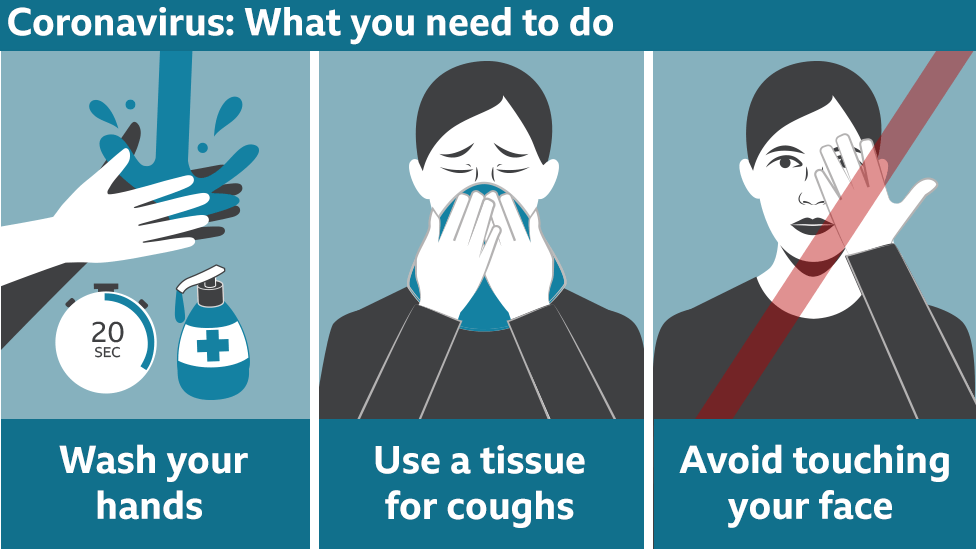Coronavirus: Are women and children less affected?
- Published

Women seem to be less likely to die from coronavirus than men, and children appear to be less likely to die than other age groups.
Most people will get a mild infection, but the pattern is clear in the most severe cases. So what is going on?
All the information we have is coming from a massive study by the Chinese Centres of Disease Control.
It looked at 44,000 people and showed 2.8% of infected men died, compared with 1.7% of women.
And 0.2% of children and teenagers died compared with nearly 15% of people over the age of 80.
Are women and children less likely to catch coronavirus?
There are two ways of explaining the findings.
Either these groups are less likely to be infected in the first place, or their bodies are more able to cope with the virus.
"Normally with new viruses circulating, everybody gets infected: that's the important point," says Dr Bharat Pankhania, from the University of Exeter.
This is because there is no immunity to the virus as nobody has been exposed to it before.
However, in the very early stages of an outbreak children may be less likely to catch the virus.
"One reason we haven't seen so many cases in children is they are protected at the beginning of outbreaks: parents keep children away from the sick," said Dr Nathalie MacDermott, from King's College London.
What's saving women's lives?
You might be surprised there's a difference between men and women's death rates from coronavirus, but scientists aren't.
We see the same effect in a wide range of infections, including flu.
Part of the answer is men are generally in worse health than women owing to lifestyle choices like smoking.
"Smoking damages your lungs - that's not going to be a winner," says Dr MacDermott.
This may be a particular problem in China, where estimates, external suggest 52% of men smoke compared with just 3% of women.
But there are also differences in the way the immune systems of men and women respond to infection.
"Women have intrinsically different immune responses to men. Women are more likely to suffer from auto-immune diseases, and there is good evidence that women produce better antibodies to vaccines against flu," says Prof Paul Hunter, from the University of East Anglia.

What do I need to know about the coronavirus?
LATEST: Live coverage of developments
EASY STEPS: What can I do?
A SIMPLE GUIDE: What are the symptoms?
GETTING READY: How prepared is the UK?
MAPS AND CHARTS: Visual guide to the outbreak

Are there any risks in pregnancy?
Officially the answer is no, but experts have raised doubts.
Pregnancy does many things to the body, including weakening the immune system.
That stops the mother's body rejecting the foetus in the womb, but it also makes women more susceptible to infection. Pregnant women are more likely to die from flu than non-pregnant women of the same age.
The UK government says there is "no obvious sign", external that pregnant women are more likely to be severely affected by the coronavirus.
"I'm not so confident," says Prof Hunter.
"It is based on data from nine pregnant women, so I don't think you can say everything is fine.
"If it was my wife, I would be encouraging her to take precautions, wash hands and so on and be double careful."
Can children get coronavirus and what are the symptoms?
Yes, they can catch the coronavirus: the youngest cases have been only days old.
There is very limited information on the symptoms of Covid-19 in children, but they appear to be mild - fever, runny nose and a cough.
You would normally expect the very young to be quite sick. That is certainly the case in flu when children under five (and especially those under two) are at higher risk of complications.
"People tend to get more ill at the extremes of age as they have lower resilience," says Dr Pankhania.
There have been some cases with more severe complications. Those with other health problems, such as a weakened immune system or severe asthma, will be at greater risk. But overall the virus appears to be milder in children.
So can children's immune systems contain the coronavirus?
There are important differences between a child's immune system and an adult's.
In childhood, our immune systems are immature and they tend to overreact: it is why fevers (a high temperature) are so common.
An immune system going into overdrive is always a bad thing because it can damage the rest of the body and is one of the reasons the coronavirus can be deadly.
"You'd expect it to go haywire and it's not doing that," said Dr MacDermott.
"There must be something this virus does that is not as readily stimulating the immune system in children, but what that is is unclear.
"They don't seem to be mounting a disproportionate immune response and some seem to be asymptomatic."
There are some diseases that it is better to have in childhood, chickenpox being a prime example, because of the way the body responds at different points in life.
However, it is worth remembering we have relatively little information in children.
"My concern is we haven't had enough cases to really know what the mortality is, particularly in the under-ones and newborn infants," Dr MacDermott says.

Why is coronavirus deadly at all?
The coronavirus starts with a fever and a cough. These are symptoms many of us will deal with at winter.
But the virus can cause the immune system to overreact. One of the more severe symptoms is acute respiratory distress syndrome caused by widespread inflammation in the lungs.
Inflammation is how the body signals it is time to fight an infection and repair itself. At its simplest level, it is why a cut feels sore, but it is actually a complex process throughout the body.
"Inflammation is a fine balancing act. If it goes wrong, you die," says Dr Pankhania.
"The virus sets up cascading inflammation of organs, and severely inflamed organs cannot do what they're supposed to do."
It leaves the lungs unable to get enough oxygen in and carbon dioxide out of the blood. It can stop the kidneys from cleaning the blood and damage the lining of your intestines.
Dr Pankhania adds: "The virus sets up such a huge degree of inflammation that you succumb... it becomes multi-organ failure."
And if the immune system cannot get on top of the virus, then it will eventually spread to every corner of the body where it can cause even more damage to inflamed organs.
Why are older people dying?
This is a combination of two things - a weaker immune system in the first place and a body less able to cope.
We know our immune system gets weaker with age.
"The quality of the antibodies you produce when you're 70 is a lot worse than when you're 20," says Prof Hunter.
And there are some suggestions older men may be more prone to high levels of inflammation which can become deadly.
A lifetime of wear-and-tear takes its toll on the body's organs and that leaves you less able to survive an infection.
"If you're 95 and your kidney function is already at 60% of what it used to be and then you hit it with something else, then [your kidneys] may no longer be functioning at the level required for life," says Dr MacDermott.
Follow James on Twitter, external
- Published6 October 2021

- Published5 July 2022

- Published23 March 2020

- Published22 February 2022
